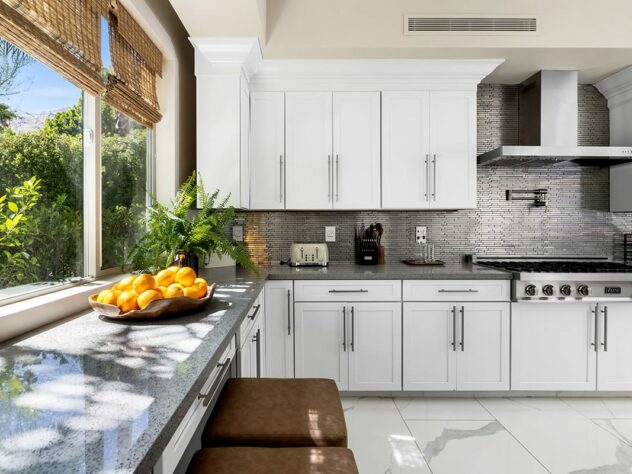Negligent hosts and property managers negatively affect the hospitality industry. Here’s how we ensure successful short-term rentals while being a good neighbor.
By: Brad Greiner, CEO of Open Air Homes and OpenAiRE Brokerage
November 11, 2022
I’m writing this blog post from the lovely Colony Palms Hotel in Palm Springs. I’m in town for one night and opted for a great boutique hotel chain I know and love as opposed to renting a house. Contrary to popular beliefs about vacation rental managers, I don’t believe short-term rentals should replace hotels or disrupt the hotel industry. In fact, I believe that there is room for both to thrive.
Both hotels and vacation rental homes existed long before platforms such as Airbnb and VRBO did. There’s a time and place for every accommodation type. Boutique hotels are great places for travelers who are in town for short periods of time but want something with more character than a branded hotel option.
Hotels play a critical role in the hospitality sector, and my belief is that the short-term rental industry needs to look to the hotel industry to continue adopting new practices to better serve guests.
However, bad actors within the short-term rental industry are giving the industry a bad name. This includes hosts and property managers who are willing to accept party groups and disrupt neighborhoods, causing severe damage to properties and the community. We urge sites like Airbnb and VRBO to continue to be diligent about weeding out hosts that put profits above communities.
Here are the three things we at Open Air Homes are most mindful of that help us continue to be good neighbors:
1. Thorough Vetting Practices
Vetting is a tricky subject. On one hand, we are always FHAA compliant and give guests equal opportunities to book our homes.
However, short-term property managers must face the fact that homes are very often within communities, and they don’t have the overnight security that hotels do. Stronger vetting procedures are necessary in order to maintain the safety and integrity of the communities we serve.
Bad hosts who allow anyone who pays into their home, regardless of their intentions, can pose a threat to communities. They may overlook party groups or groups with a higher occupancy count than the home can safely occupy. They may use the excuse that they don’t live nearby, so it isn’t their problem.
Unfortunately, this carelessness gives the entire industry a bad reputation, and guardrails are needed at this time to put the community as a key stakeholder within this industry.
2. Saying No to Party Groups
We’ve posted about our desire to host multi-generational families, digital nomads, and groups of discreet individuals to feel at home in one of our amazing vacation rental properties.
However, there are clear signs that groups may intend to throw a party or large event, and too many can greatly erode the fabric of a community.
We at Open Air Homes have made the decision not to host bachelor and bachelorette parties. While we understand that revelers will always need somewhere to go, we’ve decided to remove ourselves from the running. In our decade of experience in this industry, there is nearly always one or two individuals who ignore house and community rules. More often than not, this will cause a safety issue or disturb long-term neighbors late at night.
Related: How to Operate a Successful Short-Term Rental While Being Mindful of Community
3. Marketing to desirable guests through thoughtful design
At Open Air Homes, we know that well-designed homes are much more likely to attract guests who value the work put into the home and are more likely to adhere to rules.
We design family-friendly homes, with the intention of hosting multi-generational groups who come to spend quality time together.
We do not add beer pong tables to homes, or games that encourage loud noise for long periods of time. When looking through a site like Airbnb, we can often spot bad hosts pretty easily: they highlight the beer pong table and drinking games, and the decor and art often evoke the energy of a party. These are clear indicators to potential guests that this is the home for them to throw a raucous party, likely creating a divide between the host and long-term residents of the neighborhood.
Not all hosts know that they’re being bad hosts when they design their homes this way. They’re trying to compel guests to book their homes. But by highlighting these drinking games, you’re ensuring that neighbors that are upset with loud groups in your home, and your home’s longevity in that community is unlikely.
Perhaps you manage a vacation rental property that doesn’t have a neighbor for miles in any direction. If that’s the case, it may make sense to market your home toward party groups. However, if your home is built within a tight-knit community, we advise hosts to be thoughtful when deciding which amenities to include and highlight in a listing.
Read our Good Neighbor Pledge.
Hotels had a 100-year Head Start – Short Term Rental Hosts Have a Lot to Learn
At Open Air Homes, we’ve begun to practice Unreasonable Hospitality. Our team looks for ways to create a truly personalized experience for every guest. We make a point to listen to their hopes for their trip, and craft the ideal trip that is specifically tailored to them.
Related: What is “Unreasonable Hospitality?”
We believe that Airbnb hosts and short-term rental operators should look to the hotel industry in order to improve. We need to stay in hotels – like I am right now – so we can feel how a to get a feel for how hotels provide excellent service. Translating this to our industry can help hosts build a more positive reputation.
Hotels for Smaller Groups & Shorter Stays, Homes for Larger Groups & Longer Getaways
What we see developing in the hospitality sector is hotels thriving for shorter stays and groups of 3 or fewer. We cater our homes to groups seeking accommodation for extended periods of time. A home is an ideal choice for a guest looking to put down roots for one or two weeks or even a couple of months.
Related: Let’s Talk About Hotels vs. Month+ Rentals
We realize that the short-term rental industry solves a critical problem: People do not want to stay in a hotel for a month and will continue to look for homes for longer stays. However, we believe we ought to borrow from hotels’ great hospitality approach. Translating that into extended-stay guests is the key to the successful operation of a vacation rental property.
Brad Greiner
Founder and CEO of Open Air Homes
Read more letters from Brad here.



